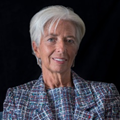Key Global Trends and Implications for the Fund’s Policy Advice

IMF SEMINAR EVENT
DATE: April 11, 2019
DAY: Thursday
2:15 PM - 3:15 PM
LOCATION: IMF HQ1 Atrium (HQ1-1-700)
Overview
Fund surveillance is at a pivotal point. Global trends in technology and demographics, among others, are changing the economic landscape in many countries. Traditional economic policy prescriptions are increasingly being questioned. New economic powers and development strategies are rising, with associated tensions between national priorities and the global common good. Against this background, the panel will explore how the IMF can step up analysis and policy advice to better serve our members as well as how to bring the membership together to ensure robust, resilient global growth.Join the conversation via #GlobalTrends
Key Global Trends and Implications for the Fund’s Policy Advice
Summary
- Key global trends. Political trends, policy uncertainty, and the rise of populism are important factors shaping the economic landscape. While Cunliffe noted that it is hard to know where these trends are taking us, Jensen claimed that these shifts, including rising protectionism and declining acceptance of economic interdependence, are in fact taking us backward. Markarova pointed to the effects of migration, not only of people but of capital and profits. She also considered that technological innovation and access to open data raise new questions on how to avoid manipulation. Huang discussed the rapid rise of fintech and its potential for increasing efficiency and access for developing countries. Shide highlighted demographics and the challenges for African countries in creating jobs.
- Policy response. Markarova and Jensen stressed that even if we are experiencing new trends and challenges, we should focus on traditionally sound policies, stay the course and push for reform, even if it takes time to see the results.
- Role of the Fund. Cunliffe said that the Fund should analyze and point out macro-critical risks, no matter where they come from. In doing so, it is important to be transparent about the underlying assumptions and uncertainties—the Fund is strong enough to subject its surveillance to outside scrutiny. Shide encouraged the Fund to work with MDBs and be more flexible and timely in its interaction with members. Jensen said that the IMF should stick to its analytical strength and its ability to voice independent and candid views. However, it should not be afraid to broaden its scope and go into new areas. When it comes to technological change and fintech, Markarova, Jensen, Cunliffe saw scope for the Fund to be a forum for discussion and to have an advisory role on common principles and frameworks.
Panelists
Moderator: Christine Lagarde
 Christine Lagarde is a French lawyer and politician who has been the Managing Director (MD) of the International Monetary Fund (IMF) since 5 July 2011. Previously, she held various, senior ministerial posts in the French government: she was Minister of Economic Affairs, Finance and Employment, Minister of Agriculture and Fishing and Minister of Trade in the government of Dominique de Villepin. An anti-trust and labour lawyer, Lagarde was the first female chair of major international law firm Baker &
McKenzie, between 1999 and 2004.
Christine Lagarde is a French lawyer and politician who has been the Managing Director (MD) of the International Monetary Fund (IMF) since 5 July 2011. Previously, she held various, senior ministerial posts in the French government: she was Minister of Economic Affairs, Finance and Employment, Minister of Agriculture and Fishing and Minister of Trade in the government of Dominique de Villepin. An anti-trust and labour lawyer, Lagarde was the first female chair of major international law firm Baker &
McKenzie, between 1999 and 2004.
Panelist: Jon Cunliffe

Sir Jon Cunliffe became Deputy Governor of the Bank of England for Financial Stability on 1 November 2013. Jon is a member of the Bank’s Financial Policy and Monetary Policy Committees, the Bank’s Court of Directors and the Prudential Regulatory Committee.
He has specific responsibility within the Bank for the supervision and oversight of Financial Market Infrastructures, for Resolution and for the provision of Emergency Liquidity Assistance. He is a member of the G20 Financial Stability Board Steering Committee, the Bank for International Settlements’ Board of Directors and the European Systemic Risk Board.
Panelist: Yiping Huang

Huang Yiping is Jin Guang Chair Professor of Economics and Deputy Dean of the National School of Development (NSD) and Director of the Institute of Digital Finance (IDF), Peking University. His current research focuses on financial reform and fintech. He served as a member of the Monetary Policy Committee at the People’s Bank of China during 2015‐2018. Currently, he is a Research Fellow at the Financial Research Center at the Counselors’ Office of the State Council. He also serves as Chairman of the Academic Committee of China Finance 40 Forum, and a member of Chinese Economists 50 Forum. He is Editor of China Economic Journal and an Associate Editor of Asian Economic Policy Review. Previously, he was a policy analyst at the Research Center for Rural Development of the State Council, senior lecturer of economics at the Australian National University, General Mills International Visiting Professor of Economics and Finance at the Columbia Business School, Managing Director and Chief Asia Economist for Citigroup, and an Independent Director of China Life Insurance Ltd and Mybank. Prof. Huang received his Bachelor of Agricultural Economics from Zhejiang Agricultural University, Master of Economics from Renmin University of China and PhD in Economics from Australian National University.
Panelist: Siv Jensen

Siv Jensen has been the Minister of Finance of Norway since 2013 and leader of the Progress Party since 2006. She has also been member of the Norwegian parliament, representing Oslo, since 1997. Prior to that, Mrs. Jensen was deputy member of the Norwegian Parliament (1993-1997) and member of the City Council in Oslo (1995–1999). Mrs. Jensen holds a bachelor’s degree in economics from the Norwegian School of Economics.
Panelist: Oksana Markarova

Oksana Markarova has been working at the Ministry of Finance of Ukraine since March 2015, holding positions of Deputy Minister of Finance – Chief of Staff, First Deputy Minister, Acting Minister and the Minister. From 2016 to early 2019, Oksana Markarova also served as Government Commissioner on Investments. In this position, she launched Ukraine’s Investment Promotion Office (UkraineInvest) and a number of other initiatives aimed at improving business climate for the current investors operating in Ukraine and attracting new ones. Before joining the government, Oksana Markarova had worked for 12 years as a board chair and president of ITT Investment Group. In 1998–1999 and in 2001–2003, she worked as an economic policy advisor and a corporate communications manager at a U.S. investment fund Western NIS Enterprise Fund (WNISEF). In 2000, she interned at the World Bank headquarters in Washington, D.C. focusing on the banking sector and financial markets in Europe and Central Asia. Оksana Markarova is a member of an Advisory Board of the National University Kyiv Mohyla Academy, an Assembly of Friends of the Ukrainian Catholic University and an international Young Presidents’ Organization. She holds a Master’s degree in International Public Finance and Trade from the University of Indiana (Bloomington, U.S.) and a Master’s degree in Environmental Studies from Kyiv Mohyla Academy. She is also licensed as a professional stock trader and asset manager.
Panelist: Ahmed Shide

Mr. Ahmed Shide is the Minister of Finance of Ethiopia since October 2018. Previously Mr. Shide served as Minister of Transport as well as Minister of Government Communication Affairs of Ethiopia. Before that, he served as a State Minister of Ministry of Finance and Economic Development for more than eight years, where he diligently led the country’s economic cooperation and regional development and integration agenda. During his service as a State Minister, he championed the economic reform endeavors of the Government and contributed to the significant development achievements the country recorded over the past couple of decades. He is now leading the economic reform agenda the Government announced recently which aims to boost private participation in many areas of the economy and enhance economic efficiency. Moreover, he also dedicatedly served the Government of Ethiopia at various capacities including at the regional state level. Minister Ahmed Shide is a member of the Federal Parliament of the Federal Democratic Republic of Ethiopia. Mr. Shide holds Masters of Arts in Participation, Development and Social Change from the Institute of Development Studies, University of Sussex, United Kingdom, Post-Graduate Diploma in Managing Rural Resources and Resource Conflicts from the Institute of Social Studies, The Hague, the Netherlands and MBA from Greenwich University, London, United Kingdom. He also holds a Bachelor of Arts in Economics from Ethiopian Civil Service College, Addis Ababa, Ethiopia.







